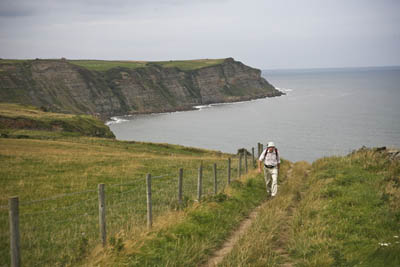
The CLA says MPs should throw out the coastal access provisions of the bill
England’s landowners’ organisation today launched a rearguard action to thwart the introduction of coastal access.
The Country Land & Business Association said MPs should throw out the proposals. The £50m cost of opening up England’s coast cannot be justified in current economic climate, it said. The Marine and Coastal Access Bill is entering its final parliamentary stages.
John Mortimer, CLA’s south-west director, told the Farmers’ Guardian: “We are in the middle of the deepest and longest recession since records began.
“How can the Government seriously justify spending £50m on what is no more than political posturing when the sums prove they can deliver a better outcome for less than £1 million?”
However, earlier this year, the Ramblers’ chief executive Tom Franklin pointed out that the South West Coast Path alone generated £300m for the regional economy. “Walking is great news for the economy and the health of the nation,” he said.
The CLA’s president Henry Aubrey-Fletcher said: “By Natural England’s own audit, 84 per cent of the English coast already enjoys public access. When areas of development, ports, defence land and so on are taken into account, it means only eight percent of the coast is inaccessible. These figures beg the question, is the legislation really justified?
“Research shows what the public really wants is for the existing access to be enhanced with better signage and facilities, less expensive car parking, and improved bus or public transport services to get to coastal paths.”
However, the audit, undertaken by Natural England with 53 local authorities and published in July, shows that there is no satisfactory or legally secure access to 34 per cent of the English coast. In the North West, this figure rises to more than half the coast – 56 per cent.
When the results of the audit were made public, Dr Helen Phillips, chief executive of Natural England, said: “The news that the public lack full access to nearly 1,000 miles of coastline is a sobering reminder of how much is at stake in the Marine and Coastal Access Bill.
“There are significant challenges ahead, but for millions of people, the bill presents a unique opportunity to transform their enjoyment of England’s countryside.”
Natural England is the Government’s statutory advisory body on outdoor issues.
Scotland already enjoys public access to non-residential parts of its coast for walkers and cyclists under the lauded Land Reform (Scotland) Act 2003. Wales is working towards a path along the whole of its coast.
The Country Land & Business Association said MPs should throw out the proposals. The £50m cost of opening up England’s coast cannot be justified in current economic climate, it said. The Marine and Coastal Access Bill is entering its final parliamentary stages.
John Mortimer, CLA’s south-west director, told the Farmers’ Guardian: “We are in the middle of the deepest and longest recession since records began.
“How can the Government seriously justify spending £50m on what is no more than political posturing when the sums prove they can deliver a better outcome for less than £1 million?”
However, earlier this year, the Ramblers’ chief executive Tom Franklin pointed out that the South West Coast Path alone generated £300m for the regional economy. “Walking is great news for the economy and the health of the nation,” he said.
The CLA’s president Henry Aubrey-Fletcher said: “By Natural England’s own audit, 84 per cent of the English coast already enjoys public access. When areas of development, ports, defence land and so on are taken into account, it means only eight percent of the coast is inaccessible. These figures beg the question, is the legislation really justified?
“Research shows what the public really wants is for the existing access to be enhanced with better signage and facilities, less expensive car parking, and improved bus or public transport services to get to coastal paths.”
However, the audit, undertaken by Natural England with 53 local authorities and published in July, shows that there is no satisfactory or legally secure access to 34 per cent of the English coast. In the North West, this figure rises to more than half the coast – 56 per cent.
When the results of the audit were made public, Dr Helen Phillips, chief executive of Natural England, said: “The news that the public lack full access to nearly 1,000 miles of coastline is a sobering reminder of how much is at stake in the Marine and Coastal Access Bill.
“There are significant challenges ahead, but for millions of people, the bill presents a unique opportunity to transform their enjoyment of England’s countryside.”
Natural England is the Government’s statutory advisory body on outdoor issues.
Scotland already enjoys public access to non-residential parts of its coast for walkers and cyclists under the lauded Land Reform (Scotland) Act 2003. Wales is working towards a path along the whole of its coast.
agentmancuso
30 October 2009I think they're going to have to come up with a better excuse than that...